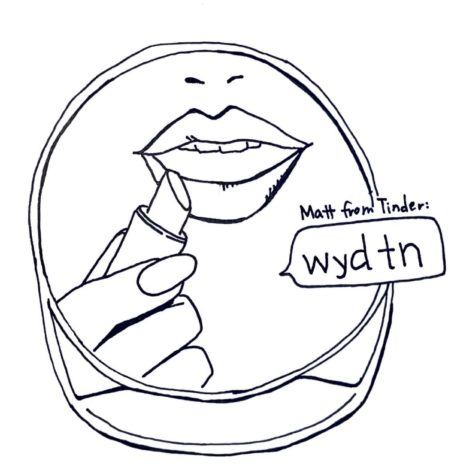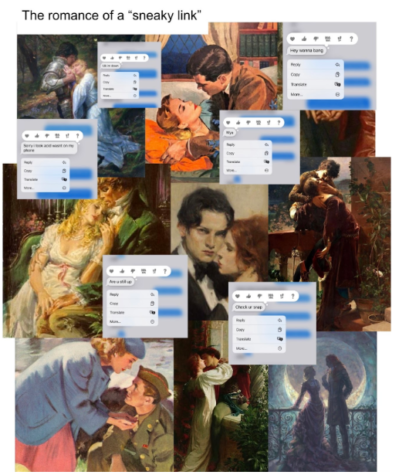U Up Rn? A Meditation on Hookup Culture
August 31, 2022

As a college-aged, female-identifying individual, your body exists as the strangest kind of currency that works both for and against you in the bizarre arena of collegiate hookup culture. To gain entrance into the arena’s most-traveled venues — i.e. grime filled fraternity basements — you must possess the “look”: silky, soft hair, preferably of a blonde tone, hair that dances back and forth with the rhythm of your well defined hips and a figure which fills out in all the right places while remaining slim. You must possess an appearance which lights up a picture frame, but at the same time, you must understand your role as the frame to a male’s picture. To be “hot” is to be allowed to participate in the social exercise of hookup culture. To be “hot” is to garner male attention. To be “hot” is to receive invitations to fraternity formals and into bedrooms.
To be “hot” is also to be forced into being objectified. To be “hot” is to receive undesired advances in musty college bars. To be “hot” is to observe as your identity is reduced to the sum of your body parts, body parts which an external source has designated as attractive. To be “hot” is to constantly question whether or not the individual pursuing your attention will dismiss your existence after entrance into your bedroom.
It’s all just kind of fucking impossible sometimes.
But this is Tulane University hookup culture as curated by the inception of dating apps, the sexual liberation movement of the 70’s and a reputation as the No. 1 party school in America.
At Tulane, hookup culture is a social exercise that typically plays out as follows: two individuals encounter one another, usually in a scenario where at least one, if not both parties have consumed at least two shots of liquor. Then, there can be a mutual understanding that “hooking up” — an incredibly ambiguous designation that can mean any number of things — is acceptable. This is typically on the basis of their present friend’s perception of the other party’s attractiveness or social affiliation. Then, the two individuals will engage in some sort of sexual activity. If the experience is enjoyable, then it is repeated — but not too many times, for the core principle of hookup culture is that the participating individuals maintain emotional distance from one another.
This emotional distance is achieved through delayed iMessage or Snapchat replies, the accumulation of multiple sexual partners, displayed coldness in public settings, lack of eye contact in the dining hall, leaving a partner’s room after intercourse or anything else that could be considered a performance of nonchalance.
The following phrases are pulled directly from conversations I have overheard or been a part of pertaining to individuals involved in a sexual relationship at Tulane:
“You stayed after the sex was done and had a conversation? You should have just dapped her up and left.”
“You’ve seen him three times now? That’s awfully intimate.”
“Never cuddle afterwards. That’s how you get yourself in trouble.”
There is the understanding that one must exude “hotness” in the physical sense while making oneself cold emotionally.
Hooking up, as outlined in Dr. Lisa Wade’s book “American Hookup: The New Culture of Sex on Campus”, “is ‘guys’ sex’…a shortage of men in college gives them the power to dictate sexual terms, making campuses a ‘sexual nirvana for heterosexual men.’”
In general, women experience far fewer orgasms than their male counterparts, as hookup culture “doesn’t promote reciprocity. It’s specifically designed for men’s orgasm.” Additionally, hookup culture is dangerously based upon “a set of ideas and practices that naturalize, justify, and glorify sexual pressure, coercion, and violence.”
All things considered, me and many of my peers participate in this social exercise. Why?
After I experienced a loss of sorts two semesters ago, I attempted to make sense of the plethora of thoughts tumbling around my head. I wrote prose and poetry, crafted music playlists and engaged in conversations with friends. I developed a sort of fascination with the individual stories of those navigating the pursuit of collegiate relationships, sexual pleasure and emotional fulfillment. This fascination culminated in the creation of a multimedia epistolary that provided a space for those individual stories. The epistolary’s pages contain the unfiltered experiences of college-aged women making sense of their lives in a collegiate context. That is, a collegiate environment that is embroiled in a hookup culture which devalues emotional intimacy and which prioritizes male sexual pleasure.
The preceding images were taken straight from the epistolary, and represent two separate tales of negotiation with hookup culture on Tulane’s campus.


I consider the epistolary to be a sort of art gallery of human experience; I also view the work as a continuously evolving project, and I feel grateful to have worked alongside Dr. Isa Murdock-Hinrichs through its creation. My intention is to spark conversation about the way college-aged individuals interact with one another and form meaningful connections.
I don’t believe there is anything normal about a campus culture which urges students to treat their intimate partners with an emotional coldness, and it is frankly a bit troubling to me that it is so normal. Yet I still believe in the power of conversation and discourse. I still believe in the aptitude of college students to acknowledge and show compassion for their peers’ inherent humanity.






















Leave a Comment